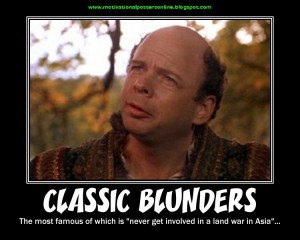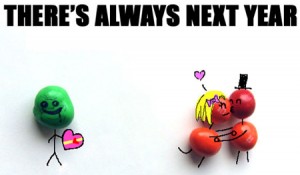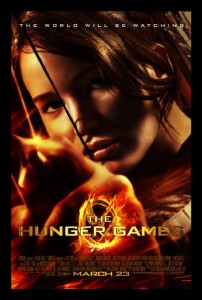My mind tends to wander at my day job (no surprise, right?) and contemplate random ideas. Most recently, I thought about how audiences are averse to characters making mistakes.
Critics and comedians alike have made careers out pointing out the “stupid” mistakes characters—villains in particular—make in many stories. I’ll be the first to say I’m not beyond making such criticisms/jokes and I love websites like the Evil Overlord List. But this begs the question: What’s wrong with characters making mistakes?

Image courtesy of www.queeofsarcasm.tripod.com
The specific instance I was thinking when this thought came to mind was Scar in The Lion King. When Simba returns to Pride Rock, Scar forces him to confess that he’s responsible for Mufasa’s death. He pushes Simba over the edge of a cliff. Then, with his nephew clutching the precipice, Scar whispers that was actually him who killed Mufasa. Simba suddenly finds a second wind and pounces on his uncle. The climactic showdown follows.
On the surface, this seems like a variation of the tried-and-true “villain’s monologue before killing hero” trope. If Scar had just kept his mouth shut, he’d probably still be king. Plenty of other villains have made the same mistake. Is it often contrived and stupid? Yes. But I would argue that when done right, it serves the story.
One of the great ironies of villains (and other characters) is that they’re undone by their own hubris. For villains it usually manifests as sadism or narcissism. In other words, they show off. They can’t just kill the hero: they have to flaunt how badly they’ve beaten them. The hero, usually being the villain’s foil, exploits this weakness, thus proving that humility trumps arrogance.
But this isn’t limited to villains. Many have criticized Hamlet’s reluctance to kill his uncle when he had the chance in Shakespeare’s classic play. (I’m amused at the unintentional irony because The Lion King was loosely inspired by Hamlet, but I digress). If he had done so, Hamlet not only would’ve avenged his father, he probably would’ve prevented his own death. (My apologies for the spoiler). 😛
I think much of this criticism stems from audiences’ own arrogance, whether they know it or not. They watch characters make mistakes and think, “I wouldn’t have done that.” Maybe they wouldn’t have. Or they would’ve made a different mistake. The truth is that both good and bad people make mistakes in real life. Napoleon made an infamous one at Waterloo. Hitler foolishly tried to invade Russia during winter. George W. Bush gave a war speech under a banner that said, “Mission Accomplished.” The list could go on. Nobody’s perfect. Art is a reflection of reality, and mistakes are part of it. That can be traced all the way back to the Garden of Eden. Mistakes can and do service a story.
So be careful next you criticize a character’s mistakes. You may as well be indicting yourself, too.
Besides, Vizzini avoided making “one of the classic blunders,” and it still got him killed!






